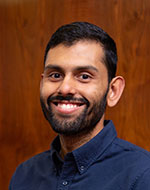We speak to Jeevan Hariharan
Jeevan Hariharan is a new Lecturer in Private Law at Queen Mary. He talks to us about himself, and his research.

Could you tell us a bit about yourself and your academic background?
I am a private law academic with particular interests in tort law, privacy, and legal theory. I was born in New Delhi, India and grew up in Sydney, Australia, before moving to London six years ago.
As an undergraduate at the University of Sydney, I was lucky enough to complete a six-year combined degree programme in Philosophy and Law. As a part of my studies, I undertook a dedicated Honours year in the Philosophy department where I worked particularly on Aristotelian ethics and the philosophy of happiness and well-being. These are topics which continue to be highly relevant to my work today.
After finishing my undergraduate degrees, I spent a year as a Judicial Assistant at the Supreme Court of New South Wales and then moved to the UK where I worked for two years at the magic circle law firm Linklaters LLP. I left practice in 2018 to undertake an LLM at the University of Cambridge and study a range of private and public law subjects, as well as Jurisprudence. Almost immediately, I knew I wanted to try and pursue a career in academia. After my LLM, I commenced a PhD at UCL in privacy theory and law supervised by Professor George Letsas and Professor Paul Mitchell, which (at the time of writing) I am just about to submit.
What are you planning to work on in the next few years? How does this relate to your past work?
A significant part of the work which I have planned over the next few years is a continuation of my doctoral project, where I explore the protection of ‘physical privacy’ in English law. Privacy, as we all know, is a hotly contested area at present: spurred by the rise of ‘Big Tech’, policy makers are confronting how to protect our privacy in an increasingly digitalised society. Yet, especially in the private law context, privacy is almost always understood through the lens of data and information. My research seeks to push against this information-centric approach, and question the way that concepts like ‘data’ frame privacy analysis. Instead, I emphasise a pluralistic conception of privacy, which embraces ‘physical’ as well as ‘informational’ components. This revised framing of privacy has significant legal and policy implications across private law.
My current and future work unpacks this primary idea and related issues from different angles. First and foremost, I am planning on producing a monograph which offers the first book-length analysis of ‘physical privacy’ in English law. Drawing on a range of topical, real-life examples such as employee monitoring, voyeurism and strip-searching, the aim of this book is to take us beyond a data-centric conception of privacy and pave the way for a novel yet practical law reform proposal using the torts of trespass to the person. I also have some full-length journal articles planned on specific issues and case studies which raise physical privacy issues. For example, I am currently working on a co-authored article with Dr Hadassa Noorda (University of Amsterdam) on the dangers of workplace surveillance. Complementing these publications, I also want to deepen public engagement with physical privacy issues, particularly in relation to home security devices, facial recognition technology and image based sexual abuse.
Beyond physical privacy, there are various other projects in private law I am working on or have planned. Over the last few years, I have become very interested in issues surrounding the award of damages in privacy and defamation cases. I published on this topic last year in the Journal of Media Law, and want to continue this work, broadening the scope of my analysis to a range of other private law actions. I also have future work planned on the Supreme Court’s upcoming decision in Fearn v Tate Gallery, which addresses the question of whether overlooking into residential properties can be actionable as a private nuisance.
Overall, I can’t think of a better place to conduct this work than Queen Mary. I really look forward to meeting everyone in the coming weeks and hearing more about other people’s research and teaching.